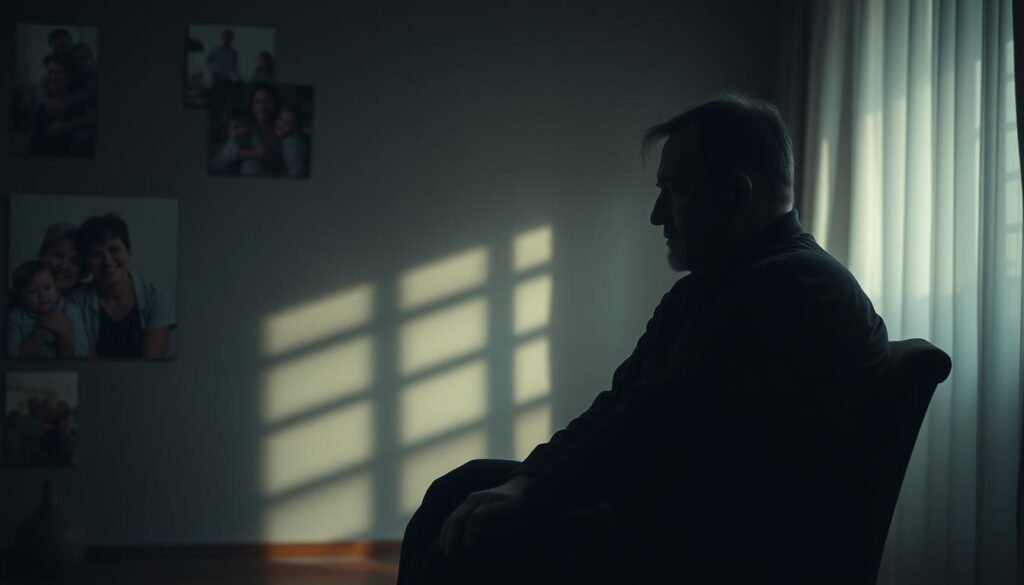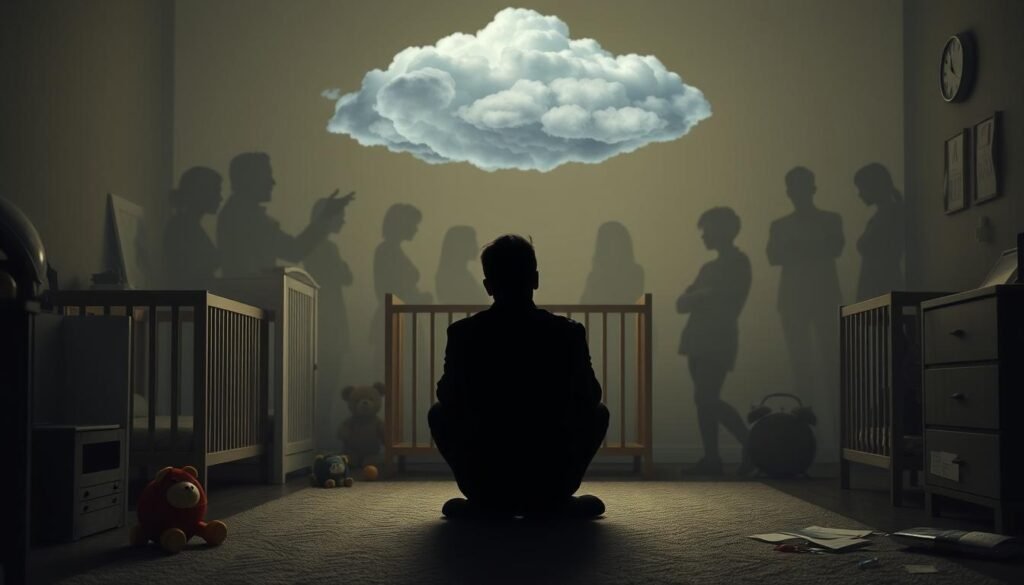Studies show 7% to 9% of new dads can get postpartum depression. It’s not just moms who face this. They may feel very sad, anxious, or worried for weeks. While we often talk about moms’ mental health after having a baby, dads’ mental health matters too.
Helping dads is key for their happiness and family bonds. Talking openly about mental health helps. It lets dads share their feelings and find support when needed.
Key Takeaways
- Paternal postpartum depression affects 7% to 9% of new fathers.
- Symptoms can include deep sadness, anxiety, and difficulty bonding with the newborn.
- Untreated depression may increase the risk of emotional struggles for children.
- Social support is crucial for recovery from paternal postpartum depression.
- Screening for depression is recommended for both parents during the perinatal period.
- Cognitive Behavioral Therapy (CBT) and good lifestyle habits play a role in recovery.
Understanding Paternal Postpartum Depression
Paternal postpartum depression, or PPND, is a big challenge for many new dads. About 10% of fathers face this condition around the time their baby is born. Symptoms like sadness, feeling inadequate, or anxiety about being a parent can appear weeks or months after the baby arrives. It’s crucial to know about men’s postpartum mental health. This knowledge helps fathers and their partners support each other better.
Depression in new dads can be partly due to hormonal changes, similar to what mothers experience. These changes can affect their mood and anxiety. Many dads feel angry, irritable, or less social when they have PPND. These different symptoms can make people misunderstand male mental health. This can make fathers feel alone and confused.
Surprisingly, up to one in four fathers may feel down three to six months after their child’s birth. Depression and anxiety often occur together. Nearly half of the people with major depression also have an anxiety disorder. Dads with a history of depression or those with partners who are depressed are more at risk.
Knowing more about men’s postpartum mental health can create better support for dads. We need to understand how depression affects new fathers. This understanding is key to breaking down stigma and starting open talks about mental health. When dads talk about their experiences, they help improve mental health for themselves and their families.
Can Fathers Get Postpartum Depression: The Statistics
About 8% to 13% of fathers face postpartum depression. This number jumps if the mom is depressed too. In fact, 30% of fathers reported symptoms when screened. This tells us we need better awareness and ways to find out who is suffering.
Fathers aged 19 to 48 are mostly affected, with 87% being from minority groups. This suggests that different social and structural issues impact their mental health. Unfortunately, only 8% of these dads seek help. It’s clear we need to do more to check on dads’ mental health.

A lot of fathers’ mood issues during this time are missed. With 54% lacking a regular doctor, getting help is hard. Between 5% and 15% might also deal with anxiety. But, there are ways to get help, like the PSI HelpLine and support groups.
Doctors often don’t check in on dads as much as they should. The American Academy of Pediatrics says talking to dads about their feelings helps the whole family. Creating a supportive space for fathers improves the way we deal with postpartum mental health.
The table below summarizes key statistics regarding depression in new fathers:
| Statistic | Percentage |
|---|---|
| Estimated prevalence of paternal postpartum depression | 8% – 13% |
| Fathers screened positive for postpartum depression | 30% |
| Fathers without a primary care provider | 54% |
| Fathers requesting mental health services | 8% |
| Fathers establishing new primary care post-screening | 13% |
Identifying Paternal Postnatal Depression
It’s key to spot signs of depression in new dads early on. About 1 in 10 new fathers are hit by it. Yet, their symptoms might not be so clear or get enough attention. The ways dads show postpartum depression can differ from moms, stressing why it’s so unique.
Common Symptoms of PPND
New dads may face both emotional and physical hurdles. These include:
- Irritability
- Anger and mood swings
- Fatigue and exhaustion
- Withdrawal from social relationships
- Physical symptoms, including headaches and sleep disturbances
Often, dads might keep these struggles to themselves. This makes it tough to see how deep the problem goes.
Differences in Symptoms Between Fathers and Mothers
Fathers might not show their struggles as openly as mothers. They could feel cut off, overwhelmed, and lonely. This makes spotting their depression harder, leading to delays in getting help. Moms might react more visibly to their feelings. Dads, however, may suffer in silence. This highlights the need for loved ones to watch for any changes closely.

| Symptoms | Fathers | Mothers |
|---|---|---|
| Emotional Expressiveness | Internalized feelings | More visible emotional responses |
| Social Withdrawal | Increased isolation | Seeking social support |
| Physical Symptoms | Headaches, fatigue | Fatigue, changes in appetite |
| Risk of Depression | 72% affected by partner’s PPD | Heightened risk factors |
Knowing how depression signs differ can boost awareness. It encourages dads to reach out for help sooner. Quick spotting of these signs helps keep family life strong as everyone adjusts to the new baby.
Risk Factors for Depression in New Fathers
It’s crucial to understand what causes paternal postpartum depression. This helps us support new dads early on. They face unique challenges that might affect their mental health, especially after their baby is born. There are many things that can make these dads feel depressed.
Hormonal Changes
Hormones play a big role in a new dad’s mood and mental health. Studies show that when a dad’s testosterone levels drop, he might feel more depressed. This change can make it hard for him to cope during a time when he needs to be strong and adaptable.
Partner’s Mental Health
A mom’s mental health greatly affects the dad too. If mom is depressed after the baby comes, the dad’s risk of feeling down doubles. It shows we need to support both parents’ mental health. This helps everyone in the family do well.
Personal and Family History
A dad’s own mental health history matters a lot. If he or his family have struggled before, he might be more likely to feel depressed after the baby arrives. Knowing this history helps us stop depression before it starts. Dads can find help through therapy and groups. For more info, check out the available links.

| Risk Factor | Description | Impact |
|---|---|---|
| Hormonal Changes | Decline in testosterone levels | Increased mood fluctuations |
| Partner’s Mental Health | Partner experiencing postpartum depression | 50% increased risk for fathers |
| Personal History | Prior mental health challenges | Higher likelihood of depressive symptoms |
| Family History | Family patterns of mental illness | Potential for inherited vulnerabilities |
The Impact of Depression on Family Dynamics
Depression in fathers brings big challenges to family life and child growth. When a dad has postpartum depression, it affects everything at home. This can lead to problems for kids that might last a long time.
Effects on Child Development
Studies show how effects on child development from paternal depression are real. Kids with depressed dads often have behavior problems. They also struggle with their mental and physical health more. About 25% of dads might go through postpartum depression. This makes the home’s emotional atmosphere worsen, showing why we need to help early on.
Interpersonal Relationships
Depression’s impact on family hits parental relationships hard. It changes how partners interact. Over 60% of couples might have someone depressed during or after pregnancy. This situation can make the other partner’s mental health worse too. Depression doesn’t bring families closer; it can cause more arguments and make everyone less happy.
It’s crucial to include dads in mental health programs. Focusing on family dynamics and mental health awareness can lessen the bad impacts. These steps can help kids and improve relationships.
| Statistic | Implications |
|---|---|
| 10% of fathers may suffer clinical depression | Potential behavioral problems in children |
| 60% of couples have a partner affected by depression | Increased family conflict and decreased satisfaction |
| 25% of fathers experience postpartum depression | Risk of negative parenting behaviors affecting child outcomes |
Recognizing When to Seek Help
Knowing when to get help for paternal postpartum depression is hard for new dads. Symptoms like ongoing sadness, anxiety, irritability, and pulling away are serious if they last over two weeks. It’s vital to talk to a doctor then. Ignoring these signs can hurt both the dad’s health and the family’s happiness.
New fathers might not notice their own symptoms with everything going on. Lack of sleep and money worries make it even harder. Since about 10% of dads face postpartum depression, getting help early is key.
- Recognize the common symptoms that may include irritability and increased substance use.
- Take note of any changes in emotional state lasting over two weeks.
- Understand that seeking help is important if symptoms interfere with daily life, relationships, or work.
Talking openly about mental health in the family helps a lot. When dads share their feelings and get support, everyone does better. This includes their partners and kids too.
If dads think about self-harm, they must get help right away. They should know that they’re not alone in this. Getting support can lead to happier families and stronger bonds.
Treatment Options for Paternal Postpartum Depression
Fathers with postpartum depression need special support. It’s important to know the effective treatments. These can improve their health and affect the whole family positively.
Psychotherapy and Counseling
Cognitive Behavioral Therapy (CBT) is a key treatment. It helps dads manage symptoms and find ways to cope. Counseling can include therapy with partners to better communicate.
Support groups offer a space for dads to connect and share. This can make them feel less alone with their struggles.
Medication and Alternative Therapies
Medication might be needed to balance mood and ease symptoms. The right medication depends on each dad’s health history. Besides, practices like exercise and mindfulness can add to the treatments. They also help dads bond with their newborns.
Dads should not hesitate to get help for mental health. Using these treatments can improve life for dads and kids. For more info, check out resources like guidances on mental well-being for dads.
The Role of Family Support
Family support is key for new dads who might face postpartum depression. Jumping into fatherhood is daunting. Having support from a partner or family eases the loneliness that comes with paternal postpartum depression. Being encouraged to bond with the baby and help with care is vital for a new parent’s mental health.
It’s crucial for family members, especially partners, to know the signs of PPND. Recognizing symptoms allows them to offer the right help during tough times. A mix of emotional support and practical aid creates a caring atmosphere. This helps the dad’s mental health and the whole family. About 10% of fathers experience depression around their child’s birth.
Recent studies highlight how important a father’s mental health is. It doesn’t just affect him but also his child’s growth. Friends and family who support new dads play a big role in reducing risks associated with paternal postpartum depression. Knowing it’s a shared journey makes a healthier environment for both parents and their child. This leads to a stronger family connection.